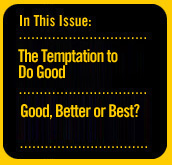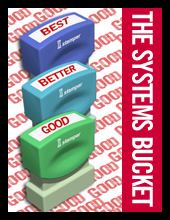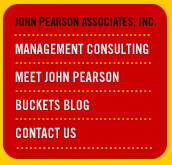

Issue No. 31 of Your Weekly Staff Meeting features a little-known book and a quick idea from The Systems Bucket. Peter Drucker said, “We now accept the fact that learning is a lifelong process of keeping abreast of change. And the most pressing task is to teach people how to learn.” Help your team members learn even more this week with Book #31 on our journey to the top 100 books you should read (in my humble opinion!).
One of my treasured books, autographed for me by the author, is Peter Drucker’s first novel, The Temptation to Do Good, published in 1984. It’s a great title and a quick read for busy leaders and managers who need a change of pace from the growing pile of must-read books.
Drucker introduces us to Father Heinz Zimmerman, president of a Catholic university. He faces all of the leadership challenges common to nonprofit CEOs: budgets, donors, staff conflicts, board members, ethical issues and more. Throw in student and faculty expectations and you’ll appreciate your current organization more—no matter how complex it is!
In this delightful novel (just 152 pages), Drucker addresses this subtle “temptation to do good” syndrome that gets many religious leaders into trouble. You’ll enjoy the story and Drucker’s memorable insights.
Your Weekly Staff Meeting Questions:
---------------------------------------------------------------------------------------------------
1. How is it that “the temptation to do good” might get you into trouble?
2. Not all learning comes from non-fiction. Describe a leadership or management insight you received from a novel you’ve read.
---------------------------------------------------------------------------------------------------
Insights from the Management Buckets Workshop Experience
A cracker-jack department head, some years back, submitted a routine project to me well in advance of the deadline. My heart sank as I read the report.
In my (feeble) mind, the project should have taken 15 to 30 minutes. My colleague had easily invested two to three hours on the assignment. It was spectacular, it was gorgeous, it was perfect (no typos), but it was unnecessary.
At the next weekly staff meeting, I announced a new vocabulary for all future projects: "Good, Better, or Best." If the assignment was for an internal document, the standard might be "Good." Maybe rough calculations on the back of an envelope will be good enough for another project. “Better” might require more work because a committee might review it and a “better” job might save us time in the long run.
“Best” is reserved when it must be perfect: website copy, donor letters, corporate annual reports, grant applications, etc. Our team appreciated the new vocabulary—because it saved them time. If I failed to delineate the scope of a future project, I was always asked, “Should this be Good, Better or Best?” Try it at your shop this week.
In our Management Buckets Workshop Experience, we help leaders create time-saving and money-saving systems that bless the team. The Systems Bucket is just one of the 20 Critical Competencies Required for Leading and Managing Today’s Nonprofit Organization.
Email me to reserve space in the May 9-10 Management Buckets workshop or the May 11 Nonprofit Board Governance workshop, both planned for Orange County, California.

Your Weekly Staff Meeting Questions:
---------------------------------------------------------------------------------------------------
1. Get in groups of two or three and review a recent project. Had you known of the “Good, Better or Best” vocabulary, would that have been helpful?
2. Organizations moving from “good to great” (per the book by Jim Collins) may confuse excellence with the “Good, Better or Best” system. Talk about that
---------------------------------------------------------------------------------------------------
Download the Management Buckets brochure
PS. Click “Forward Email” below to recommend this free eNews to a colleague.






